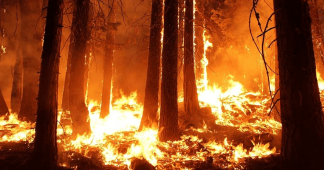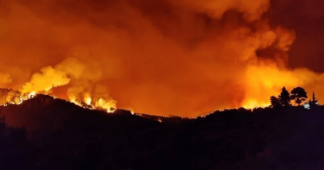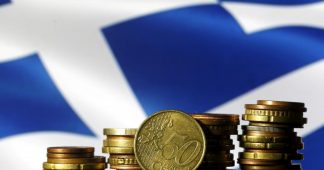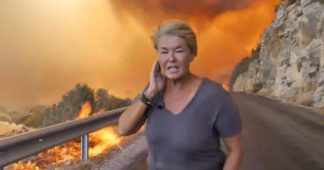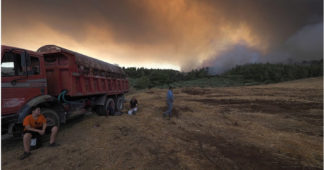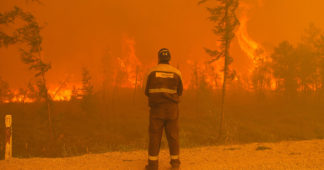by Stelios Foteinopoulos *
Aug. 22, 2021
Photo credit: Lotus R
If Ferdinand Lassalle lived today, he would be able to watch his ideas age badly. In 1862, Lassalle, speaking to a socialist gathering in Berlin, outlined his theory of the night-watchman state – a neoliberal concept whereby the state transfers its modus operandi to the private sector and keeps only a few vital but limited functions, like ensuring security and social stability.
In the last few weeks in Greece, the majority would be surprised to see a glimpse of that. The Greek state fell short, even compared to a night-watchman whose sole duty is to prevent the worst.
As I write, more than 250,000 acres of Greece have been burned by raging wildfires, 150,000 only in the island of Evia. More than 100,000 people have been affected.
The series of fires in the last two weeks has charred large areas in Athens, the Peloponnese, and elsewhere. Forty communities and towns have been swept away, and the fires remain out of control, forcing thousands to flee their homes, often at short notice. At most fire fronts, resources of fire trucks, ground forces, and aerial firefighting have been limited or even non-existent. The EU states that in the past forced Greece to accept budget cuts now rush to provide aid and water-dropping planes.
The worst ecological disaster of all time in Greece, and one of the worst in Europe, came at the peak of an extreme heatwave that lasted about three weeks. Heat dried up scare moisture and left pine forests primed to burn – proving that climate breakdown is already with us.
The question left hanging in the air is simple. Could any of these outcomes have been prevented? Have these fires directly resulted from the effects of the climate crisis, or is it something more complicated?
In November last year, right before the Greek government drafted 2021’s annual budget, the Forestry Authorities formally requested 17.7 million euros. The government gave them only 1.7 million.
That didn’t come as a surprise: the past years have been ones of austerity and cuts. From 2016 to 2020, the average government spending directed to the Forestry Authorities was only 1.72 million euros, leaving its operations structurally underfunded and therefore understaffed – despite the fact that a third of the country is covered in forest. Around five thousand firefighters also saw their contracts come to an end while the government increased the number of police by several hundred.
Austerity is very present in Greece, despite what the neoliberal thinkers may preach about a return to ‘economic normality’. The wildfires in Evia, the second-largest Greek island after Crete, mark the devastating results of a state that fails to align its priorities with those of its people. In the last months, 1.9 billion euros were dedicated to buying fighter aircrafts to justify the military antagonism between Greece and Turkey (both NATO members), and 6.6 billion euros were given to NATO. 30 million euros were allocated to set up a special police force to be placed in Greece’s public universities. Therein lies the contradiction of a state that spends so much on suppression mechanisms but cannot provide security.
The government’s strategy to deal with the fires was largely based on evacuation messages sent to residents’ mobile phones. But the prime minister’s efforts to avoid casualties backfired: with no lines of defence around the villages and the small towns, the locals decided to take over and fight the battle themselves. Using everything from hoses to farmer vehicles, tank trucks to shovels and spades, locals, together with people who happened to spend their holidays in the area, threw themselves into the fires, often with remarkable results. As a result of the emergency and the state’s inability to provide the necessary support, solidarity networks were allowed to take initiative.
These networks and organisations are now in charge of the situation. They started building counter-structures to supply basic necessities to the people affected, set up social kitchens, brought generators where the electricity is cut, and provided psychological support to those who need it. A new world literally rising from the ashes has allowed people to reflect on what has happened and what is yet to come.
The fire is now nearly under control, but the full extent of its devastation has yet to be determined. Thousands of people face long-term evacuations and the loss of their homes, farms, and businesses, let alone infrastructure.
This is a question of survival for the local communities rather than crisis management for the marginalised. In a world experiencing climate change, we are all potentially marginalised. Watching people flee their homes to the small boats on the coast saves us having to imagine what climate refugees might look like.
Zooming out from local to global forces us to see that there is nothing ‘orderly’ about the neoliberal order in the world today. Before we end up fighting for the survival of our communities, we should consider whether the fight for wealth redistribution and a major shift in the priorities of our states is a sine qua non condition for standing a decent chance. We should also consider what comes next: worsening inequalities, fighting over the remaining resources, social and geopolitical instability.
What is happening in Greece might just be the prelude to all these futures. If those who fuel the global climate crisis do not intend to take action, it will have to be us.
* Stelios Foteinopoulos,is a former International Relations Policy Officer at the Nicos Poulantzas Institute in Athens, Greece. He is now a European Union affairs analyst and a member of Momentum.
Published at www.cadtm.org
